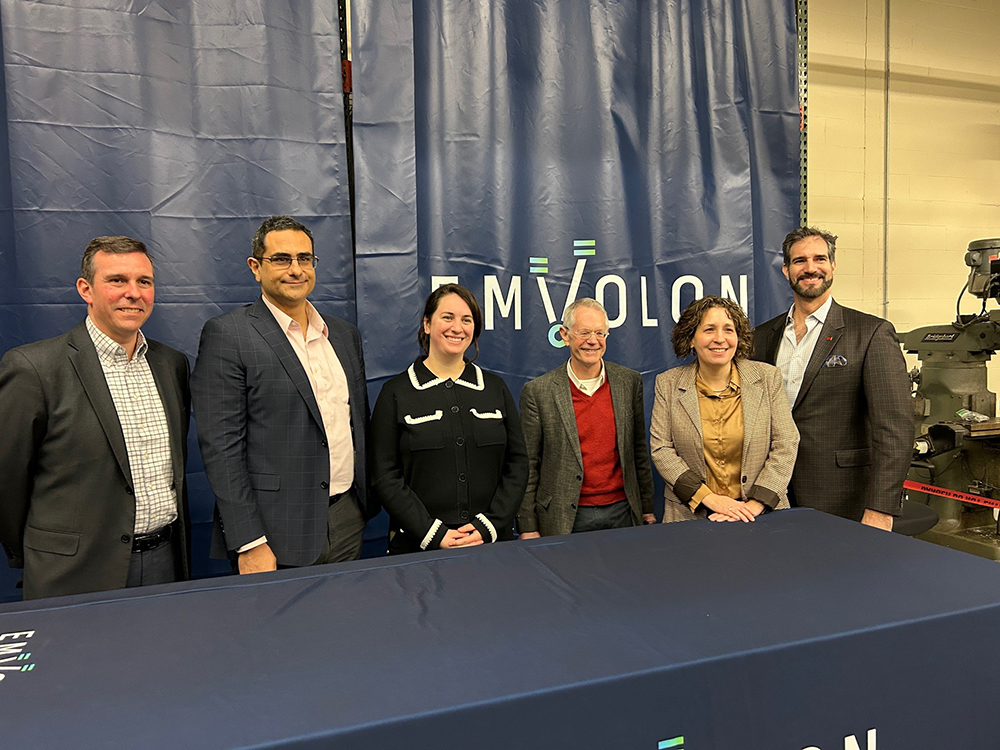The cleantech industry along with Middlesex 3 Coalition and Cummings Properties hold panel discussion event

Emmanuel Kasseris, CEO of Emvolon; Casey Hagerty, Woburn’s economic development manager;
Gus Block, corporate development director at Nuvera Fuel Cells; Stephanie Cronin, executive director,
Middlesex 3 Coalition, and panel moderator Demetrius Spaneas, president of Land and Sea Real Estate
Woburn, MA Nearly 50 cleantech industry leaders gathered to explore the evolving landscape of clean energy, sustainable infrastructure, and the unique real estate requirements of cleantech companies. The program, held at Emvolon’s R&D facility, was co-hosted by Middlesex 3 Coalition and Cummings Properties.
The panel of experts included Casey Hagerty, Woburn’s economic development manager; Emmanuel Kasseris, CEO of Emvolon; Jeff Pelletier, senior account manager at Cummings Properties; and Gus Block, corporate development director at Nuvera Fuel Cells.
Starting with the question “What is Cleantech?” the panel discussed the transition from fossil fuels to renewable energy, and shared examples of innovations in energy, waste management, and sustainable infrastructure.
Kasseris and Block explained how technologies like fuel cells, hydrogen solutions, and waste-to-energy systems are leading the charge in advancing cleantech adoption. These innovations are helping industries transition to cleaner, more efficient energy sources.
Kasseris’ firm, Emvolon, converts greenhouse gas emissions into carbon-negative fuels and chemicals like green methanol and green ammonia by repurposing car engines as cost-effective, modular chemical plants.
Pelletier provided his perspective on how Cummings and other real estate developers are increasingly adopting sustainable technologies, such as electric vehicle (EV) chargers and energy-efficient retrofits, to align with the growing demand for environmentally responsible building practices.
Cummings provides office and lab space in town for dozens of cleantech firms, including Active Surfaces, Alsym Energy, Boston Metal, Daqus Energy, SES, and Verdox. Noting that the town is a hub for cleantech growth, Hagerty discussed its favorable zoning, permitting processes, and accessible workforce development opportunities.
“Creating a thriving cleantech community requires collaboration between municipalities, industry stakeholders, and commercial real estate leaders,” said Pelletier. “We are grateful to Middlesex 3 Coalition for convening this event and supporting economic development in Woburn and the region.”
Middlesex 3 Coalition is a regional economic development organization brings together businesses, government entities, and academic institutions from the corridor along Route 3 and Middlesex Turnpike. It aims to build the region’s economy and solve challenges in transportation, workforce development, and sustainability.
Cummings Properties’ 11 million s/f of commercial real estate accommodates labs and clean rooms, offices, healthcare facilities, restaurants, retail storefronts, warehouses, executive suites, and more. With a portfolio of this size and variety, the firm can meet virtually any commercial real estate need. Its in-house experts in design, construction, and property management offer “one-stop shopping” for the business community.
Atlantic Property Management expands facilities maintenance platform: Assigned two new facility management contracts in RI


Connecticut’s Transfer Act will expire in 2026. What should property owners do now? - by Samuel Haydock

New Quonset pier supports small businesses and economic growth - by Steven J. King

Tenant Estoppel certificates: Navigating risks, responses and leverage - by Laura Kaplan


 (1).png)







 (1).png)
